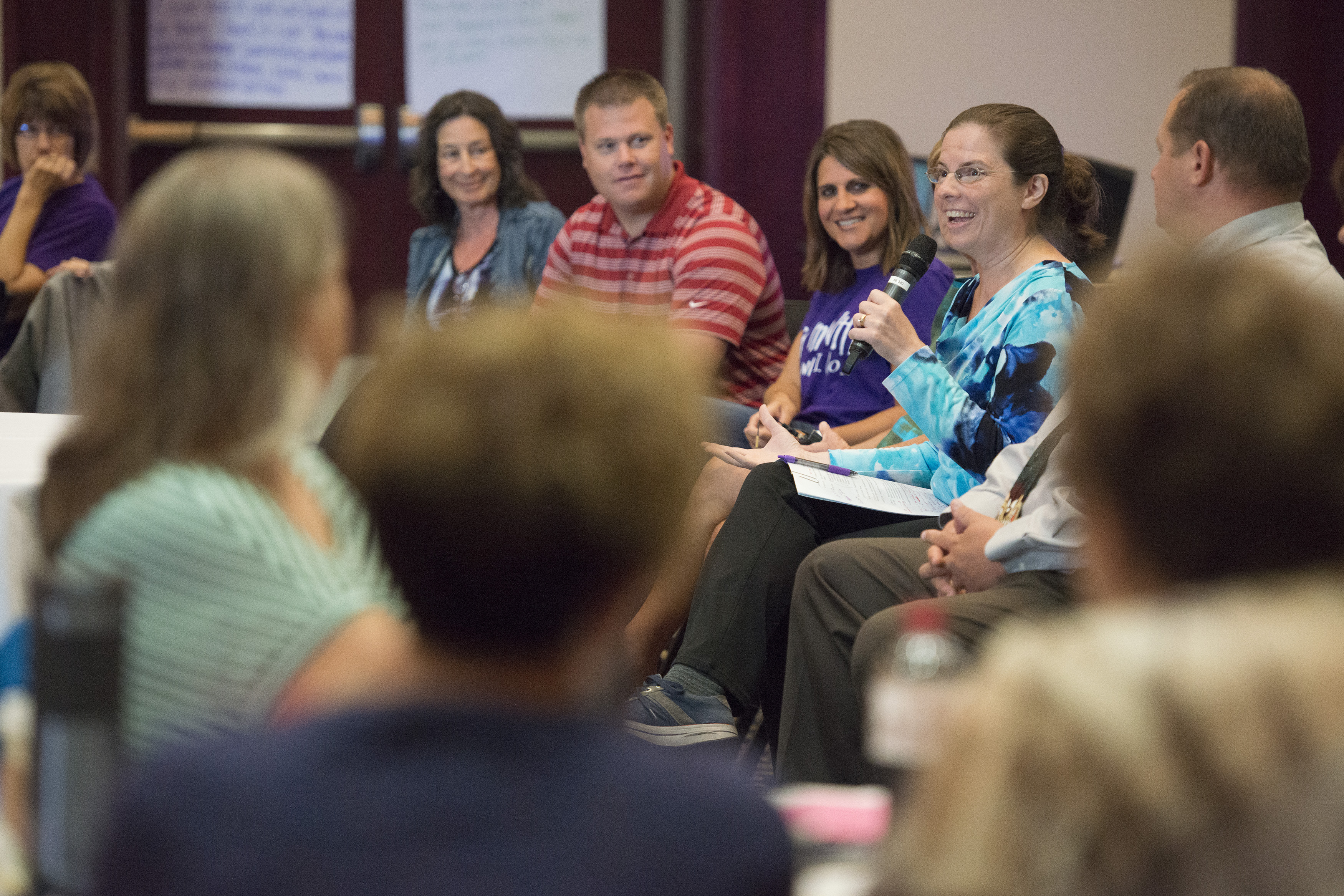
Education professionals from the Augusta and Cornell school districts participate in a workshop led by UW-Eau Claire education studies faculty. The workshop is part of a three-year program supported by a UW System Improving Teacher Quality grant.
Two regional school districts will work to boost students’ literacy skills, thanks to a recent event at UW-Eau Claire.
The university recently hosted 100 teachers, principals, and other education professionals from the Augusta and Cornell school districts for a workshop led by education studies faculty members Janine Fisk and Deb Pattee, and music education faculty member Laura Dunbar.
The workshop, however, was just the beginning of a three-year-long program, “Improving Teacher Quality and Reading Achievement through Knowledge, Collaboration and Culturally Relevant Pedagogies,” proposed by Fisk and Pattee, and developed in collaboration with professionals in the Cornell and Augusta districts.
This ambitious and comprehensive teacher development program was made possible by a UW System Improving Teacher Quality grant secured by Fisk, Pattee and Dunbar. The grant awards about $125,000 per year for three years.
In addition to the annual summer workshops, the grant will cover the program’s biannual two-day seminars, one each fall and spring, as well as stipends for each teacher to hire a substitute for one day during the academic year. This will give the teachers time to learn from each other through collaboration and observation, something many educators don’t often get the chance to do.
The Augusta and Cornell school districts were chosen by the UW-Eau Claire faculty trio based on their high percentage of students in poverty and their geographical closeness to each other, making them the perfect districts to collaborate and tackle the intertwined issues of literacy and poverty.
According to a report from the Wisconsin Department of Public Instruction, 63.8% of students in the Cornell School District were eligible for the state’s free and reduced lunch program as of 2015. The same report showed the Augusta School District to have similarly high levels of eligibility for the program at 50.2%, putting both districts in the top quarter of schools statewide.
DPI District Report Cards from the 2013-14 academic school year show Augusta and Cornell school districts to have scored similarly to the state average in student reading achievement, student reading growth and closing reading achievement gaps. But while standardized test scores can be helpful in tracking achievement and growth statewide, Pattee said education is fundamentally about students on an individual level.
“[What we taught at the workshop] enters into their practices, and it’s all about student learning. I mean that is what it’s about. Test scores? Yes, but it’s about student learning. As long as we keep the students in mind. Who are our students? We emphasize that a lot. What you would do in one district might not work in another district,” Pattee said, later adding, “They need to know who their students are before they can work on content.”
Carol Dweck, foundational researcher in the study of mindsets, says praising qualities like talent or intelligence can actually hinder students’ self-esteem and accomplishments by allowing them to think they don’t need to develop any further. Basically, if you tell a student they’re smart, they will accept intelligence — not dedication nor perseverance — as their defining trait and will stop putting in any effort. This creates what Dweck calls a fixed mindset: one in which people believe their and others’ abilities are static.
In their workshops, Pattee, Fisk and Dunbar worked with the attending teachers to discourage the fixed mindset, instead introducing Dweck’s growth mindset, wherein people believe their and others’ inherent abilities are only starting points to be improved upon with effort and self-development. It seems simple enough, but Fisk said that when a teacher approaches their students with this frame of mind, students can only benefit.
“It makes a huge difference,” Fisk said. “You want to encourage your students so that they have a growth mindset, so they feel like they can grow and learn. We show that to our students by who we are and how we model it. So if we don’t come into the classroom with that growth mindset, sometimes we put limitations on our students or make them feel like they can’t learn or they’re bad at reading or whatever, because we don’t have that growth mindset to help encourage all students along the way.” “Or they put that negative fixed mindset on themselves,” Pattee added, and Fisk continued, “because they compare themselves to other students.”
Pattee, Fisk and Dunbar stress that while they’ve initiated the project, their role with the participating educators is to be equal contributors in the learning process.
“It is our intent that we aren’t there as the ‘university folks,’ the experts. We’re not. In fact, they’re the ones teaching out there every day. We’re all in this together,” Pattee said, later adding, “We really believe [the workshop] was so successful because it’s a collaboration, not just the university coming in and doing whatever we want to do.”
While the UW-Eau Claire educators have a lot of planning to do for their program’s next three years, last week’s workshop provided an encouraging start.
“It was very invigorating, and I believe that teachers were energized,” Pattee said, “and that will no doubt affect their families and their communities.”
